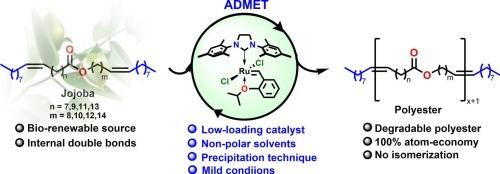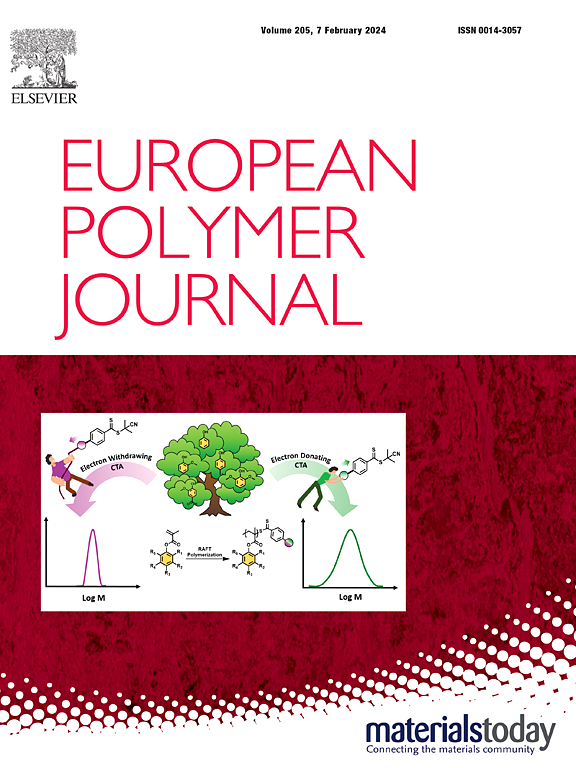沉淀驱动ADMET聚合荷荷巴油制备可回收生物可再生聚合物
IF 6.3
2区 化学
Q1 POLYMER SCIENCE
引用次数: 0
摘要
由于不饱和天然油、蜡及其相关脂肪酸的丰度和参与复分解反应的倾向,它们是可持续聚合物合成的有希望的起始材料。本研究在温和的条件下,通过原子高效的催化过程,有效地实现了荷荷巴油的缩聚聚合,以生产高分子量聚合物和有价值的9-十八烯作为缩聚物。将荷荷巴油完全转化为相应聚酯的基本突破是通过迭代沉淀技术将聚合物从9-十八烯中分离出来。所得的高分子量聚酯可以在碱性水解条件下分解,并通过酸催化的酯化反应将得到的降解产物重新聚合。这些发现强调了荷荷巴衍生聚酯在闭环回收方面的潜力,在闭环回收中,聚合物可以化学分解并重新组装成新材料。这项研究中开发的技术可以进一步扩展,以环保的方式从其他天然油和蜡中生产出广泛的有用的生物可再生聚合物。本文章由计算机程序翻译,如有差异,请以英文原文为准。

Precipitation driven ADMET polymerization of jojoba oil for recyclable biorenewable polymers
Unsaturated natural oils, waxes, and their associated fatty acids represent promising starting materials for sustainable polymer synthesis due to their abundance and propensity to participate in metathesis reactions. In this work, the polycondensation polymerization of jojoba oil to produce high molecular weight polymers and valuable 9-octadecene as the condensate is efficiently achieved through an atom-efficient catalytic process under mild conditions. The fundamental breakthrough for the complete conversion of jojoba oil to the corresponding polyester was accomplished by separating the polymer from 9-octadecene via an iterative precipitation technique. The resulting high molecular weight polyesters could be readily deconstructed under basic hydrolytic conditions and repolymerized by acid-catalyzed esterification of the obtained degradation products. These findings underscore the potential of jojoba-derived polyesters for closed-loop recycling, where polymers can be chemically broken down and reassembled into new materials. The technology developed in this study can be further expanded to produce a wide range of useful bio-renewable polymers from other natural oils and waxes in an environmentally accountable manner.
求助全文
通过发布文献求助,成功后即可免费获取论文全文。
去求助
来源期刊

European Polymer Journal
化学-高分子科学
CiteScore
9.90
自引率
10.00%
发文量
691
审稿时长
23 days
期刊介绍:
European Polymer Journal is dedicated to publishing work on fundamental and applied polymer chemistry and macromolecular materials. The journal covers all aspects of polymer synthesis, including polymerization mechanisms and chemical functional transformations, with a focus on novel polymers and the relationships between molecular structure and polymer properties. In addition, we welcome submissions on bio-based or renewable polymers, stimuli-responsive systems and polymer bio-hybrids. European Polymer Journal also publishes research on the biomedical application of polymers, including drug delivery and regenerative medicine. The main scope is covered but not limited to the following core research areas:
Polymer synthesis and functionalization
• Novel synthetic routes for polymerization, functional modification, controlled/living polymerization and precision polymers.
Stimuli-responsive polymers
• Including shape memory and self-healing polymers.
Supramolecular polymers and self-assembly
• Molecular recognition and higher order polymer structures.
Renewable and sustainable polymers
• Bio-based, biodegradable and anti-microbial polymers and polymeric bio-nanocomposites.
Polymers at interfaces and surfaces
• Chemistry and engineering of surfaces with biological relevance, including patterning, antifouling polymers and polymers for membrane applications.
Biomedical applications and nanomedicine
• Polymers for regenerative medicine, drug delivery molecular release and gene therapy
The scope of European Polymer Journal no longer includes Polymer Physics.
 求助内容:
求助内容: 应助结果提醒方式:
应助结果提醒方式:


